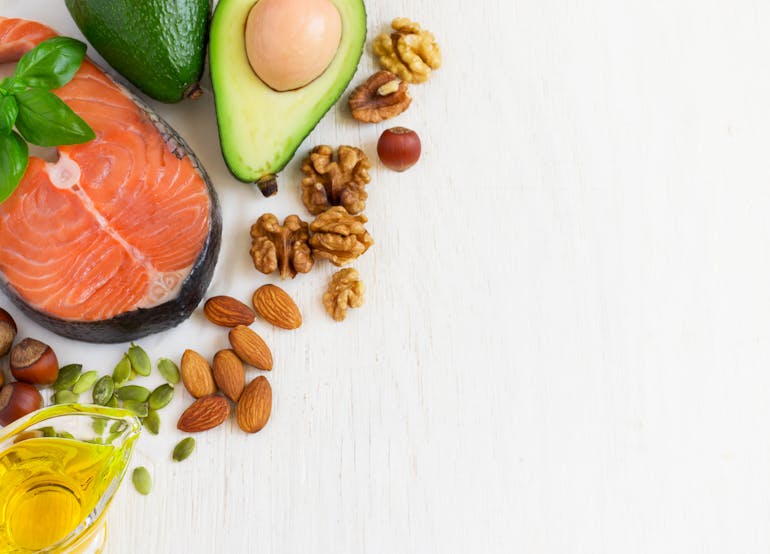What is Omega-3 and why is it good for you?
Reviewed and fact-checked by Giulia Guerrini, Superintendent Pharmacist. Read our editorial policy to see how we create informative, accurate content.
We’ll take a guess: you’ve probably heard of omega fatty acids, and you’ve also probably heard that they’re important for your health. There’s omega 3, 6 and 9: but it’s omega 3 that most people can name the fastest. However, not everyone knows the ins and outs about this fatty acid and why it’s so important for your health. Read on for a deep dive into everything you need to know about omega 3.
What is Omega 3?
Omega 3 is a group of fatty acids that your body can’t produce – that’s why it’s so key that you get them from elsewhere. Your body can make most of its fats from other materials, but this isn’t the case for omega 3 fatty acids. Omega 3 is an essential part of your diet, and there are three main types of omega 3 that you need to get from there:
ALA
Alpha-linolenic acid (ALA) is the most common omega 3 in your diet. It’s used for energy and is also converted into the biologically active forms of omega 3, which we’ll talk about in a bit. However, the body isn’t very good at converting ALA into the other omega 3s, and the process is pretty inefficient, sadly.
DHA
Docosahexaenoic acid (DHA) is the most important fatty acid. This omega 3 is a key structural component of the brain, eye retina and more (all the big ones). This is one of the biologically active forms that ALA can be converted into.
EPA
Another of the biologically active forms of omega 3 that ALA can be converted into is Eicosapentaenoic acid (EPA). Part of this can further be converted into DHA. This omega 3 has a huge range of functions in the body, which we’ll dive into another time.
What does Omega 3 do?
Omega 3 fatty acids have a ton of roles within the body. They’re essential, and so are needed to live a healthy lifestyle. Here are some of the benefits of omega 3:
Eye health
The omega 3 DHA is a major structural component of the eye retina. This means that not getting enough of this omega 3 could potentially cause vision problems – something you’d definitely want to avoid, if possible.
Heart health
It's long been known that communities that traditionally eat a lot of fish have low rates of heart disease and strokes, which has been linked to the amount of omega-3 in their diet. Now, these fatty acids have been linked to numerous heart health benefits, including:
- Reduced blood pressure
- Prevention of blood platelets clumping together, therefore helping to prevent blood clots
- Reduction in triglycerides
- Prevention of plaque build-up in the arteries
- Raising levels of HDL (the "good" cholesterol)
Brain health in pregnancy & early life
Little ones need all the help they can get, and Omega 3s are vital for brain growth and development in infants. In fact, the polyunsaturated fatty acids in your brain are about 40% DHA, and this is 60% in the retina of your eyes. So, getting enough omega-3 during pregnancy and early years is key for a child’s growth. Having enough omega-3 during these stages of development have been linked to:
- Better communication and social skills
- Reduced behavioural problems
- Higher intelligence
- Decreased risk of cerebral palsy, autism, and ADHD
Depression and anxiety
Omega 3s have been linked to a reduced risk of depression. Studies, like this one have indicated that people who regularly consume omega 3 are less likely to be depressed. Other studies have shown that omega 3 can help to reduce the symptoms of depression and anxiety. Out of the three types of omega 3, it appears that EPA is best at fighting depression.
Age-Related mental decline
One of the unavoidable consequences of ageing is a decline in brain function. However, omega 3 can help to decrease this impact of ageing. A higher omega 3 intake has been linked to decreased mental decline and a reduced risk of Alzheimer’s disease in various studies, like this one.
Skin health
Your skin is made up of various materials – and one of these is the omega 3 DHA, which is responsible for the health of cell membranes. Having enough DHA results in healthy cell membranes, which means your skin will be soft and supple (who wouldn’t want that?). EPA omega 3 can also benefit your skin, as it can:
- Prevent red bumps on the upper arms
- Reduce premature ageing of the skin
- Manage oil production and skin hydration
- Reduce the risk of acne
Omega 3 deficiency
As omega 3s have a huge range of roles within the body, from brain health to skin health, a deficiency can show itself in a variety of ways. Some of the signs of an omega 3 deficiency can include:
- Problems sleeping
- Reduced concentration
- Dry skin
- Brittle hair
- Joint pain
- Allergy symptoms
How to make sure you’re getting enough Omega 3
By now, it’s pretty clear that omega 3 is a vital part of a healthy diet, right – so getting enough is important for your health. You can’t make the omega 3s you need, so you’ve got to make sure you get them in your diet or through supplements. EPH and DHA are the most important omega 3s to get in your diet. The guidelines are that you should aim to consume a combination of 500mg of these fats a day.
Omega 3 foods
Omega 3 is easy to find in a variety of oily fish (you probably thought of fish as soon as we said ‘Omega 3'), and these tend to be the best sources, as they contain DHA and EPA. In fact, these two omega 3s are often called the "marine omega 3s" due to fish being the best source of them. There are some plant sources of omega 3s (we’ve got those here too), but these tend to only have ALA and not DHA and EPA. Some omega 3 foods include:
- Mackerel
- Cod liver oil
- Salmon
- Sardines
- Walnuts
- Flax seeds
- Chai seeds
- Whitebait
- Trout
- Green, leafy vegetables
Omega 3 Supplements
As the best sources of omega 3s tend to be fish, you might find getting enough omega 3 in your diet a bit difficult if fish isn’t part of your diet. If you’re a vegetarian, vegan, or just don’t like fish, getting enough of the three main omega 3s you need might be easier said than done. Luckily, there are plenty of omega 3 supplements to help you get what you need, including ones that are suitable for vegans. FSC Foil Fish Oil contains omegas 3, 6 and 9, to ensure you get the right balance of omegas in your diet. A cod liver oil supplement, like Lindens Health + Cod Liver Oil provides EPA and DHA, as well as being enriched with Vitamin A and Vitamin D. If you find the fish supplements too much taste-wise, don’t worry – there are other options. Cleanmarine Krill Oil is another omega 3 supplement that will make sure you’re getting DHA and EPA in your diet. For vegans and vegetarians, we’ve also got great supplements available to help. Flaxseed, such as Lindens Health + Nutrition Vegan Omega is a good source of omegas 3, 6 and 9 for those on a plant-based diet.
Know what you need? Up to date on why Omega 3 is so important? Great – now pick up supplements to help. Check out our Omega 3 and Fish Oil section for supplements you can order today, for delivery tomorrow.

